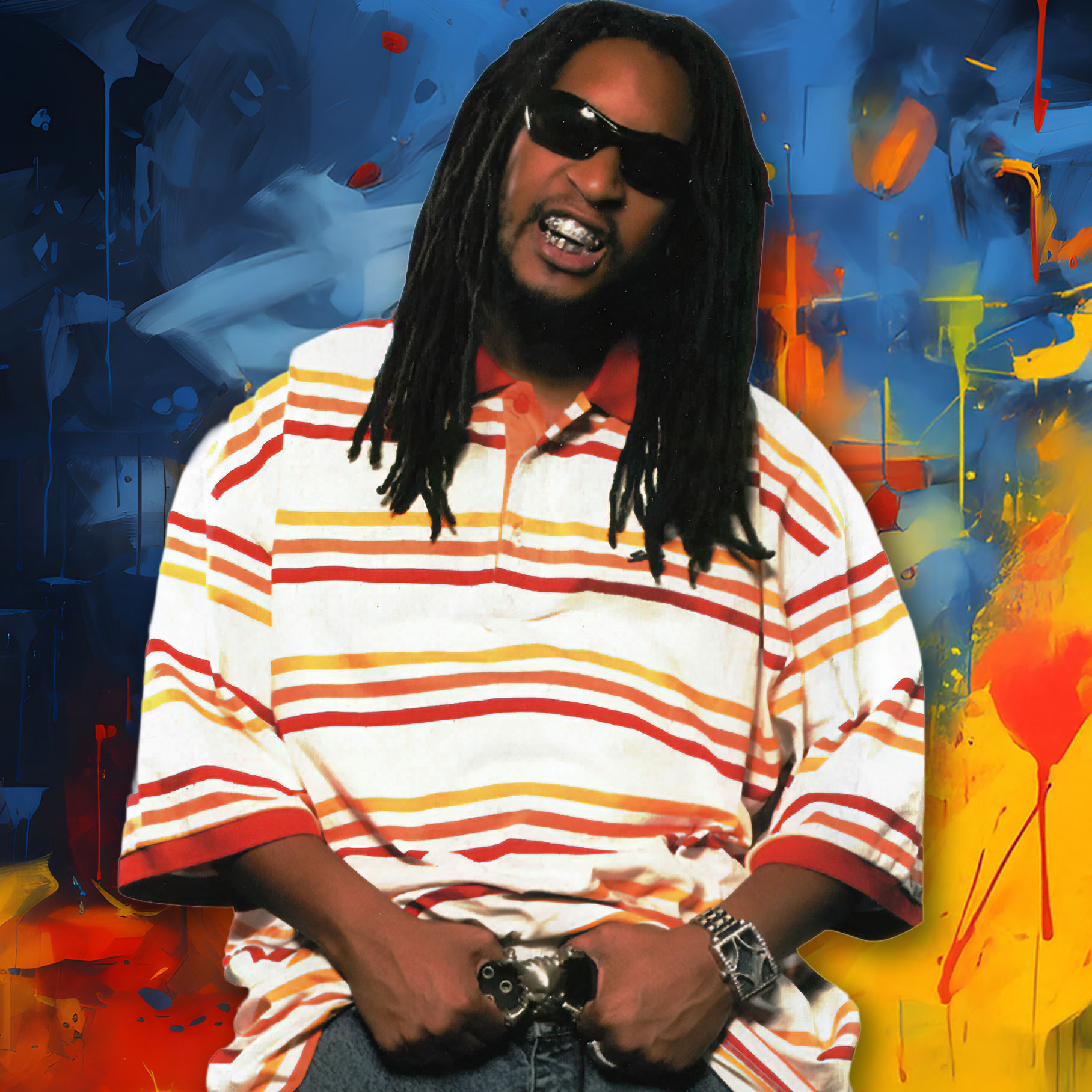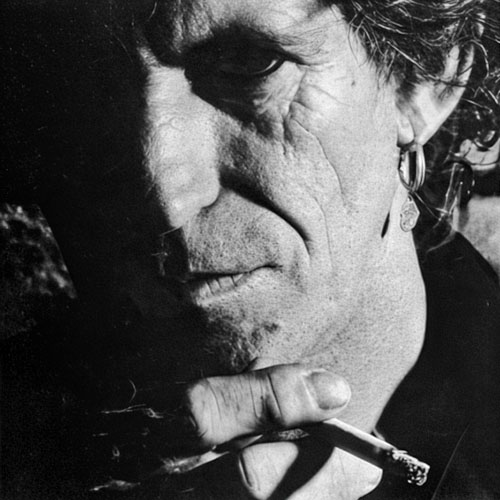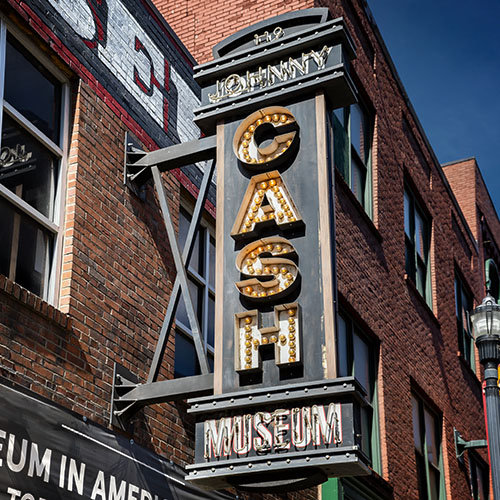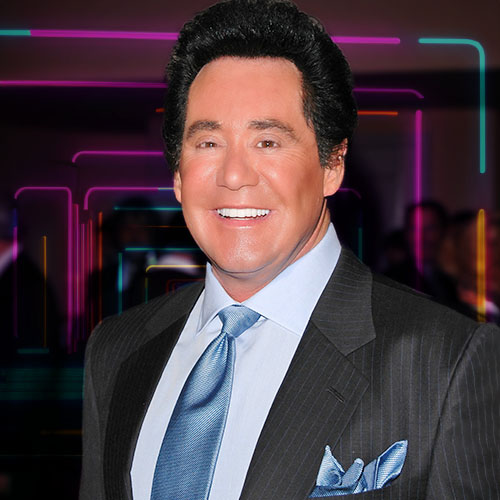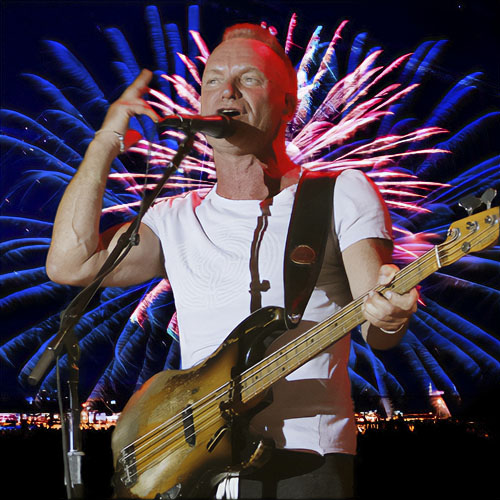“My images came from this terrific emotional input, from putting myself through an awful lot of desperate and tragic circumstances and experiences. I’ve been through these images, not just put them down on paper.”
David Bowie: The Penthouse Interview
David Bowie has changed his music, his look, and his entire public persona so radically, and so many times, that the idea of there being a “real” David Bowie beneath it all has often seemed naive, perhaps even ludicrous. Even so, it’s difficult to believe, after all those poses and faces of his, that David Bowie has been on this planet for only thirty-six years.
Born in Brixton, a tough London neighborhood, Bowie first intended to be a painter, and those early artistic ambitions, coupled with his strong interests in mime and the theatricality of the French surrealists and Dadaists of the twenties, were no doubt of help to him in his many transformations to come.
In the beginning, there was Bowie, the smart, handsome young mod. It was 1964 and he was already heading his first rock group, the King Bees, and cutting a record. Later Bowie would become a guitar-strumming songwriter in an ankle-length gown and with hair like Veronica Lake’s. But he would have to wait until 1969 before success gave him his first English hit single, “Space Oddity,” a five-minute story about an alienated astronaut that capitalized brilliantly on the popularity of Stanley Kubrick’s 2001: A Space Odyssey.
During the early seventies, he transformed himself again. This time into Ziggy Stardust, who looked like some sort of androgynous spaceman in flame-red hair and platform shoes but who was recognized by young fans the world over as a figure representing the alien inside every misunderstood, sexually insecure adolescent. On stage Bowie pushed his sexual ambiguity by performing a kind of pseudo-fellatio on his lead guitarist, Mick Ronson, and offstage he told the press that he had met his look-alike wife, Angela, “when we were both laying the same bloke.” Call it Glitter Rock, Glam Rock, whatever, his public ate it up — and so did the press. One reporter asked his wife, “How does it feel to be married to the man who everybody thinks is the world’s king faggot?” Angela was ready: “I think it’s great. I love it. It all depends on your knowledge of gay culture, of which I can happily say I’m a member.”
Bowie ran with the bisexual label and recreated his alien stage persona in the film The Man Who Fell to Earth. (And this was years before E.T. made Steven Spielberg the richest man in Hollywood.) Bowie continued to try more roles on for size. Somewhere along the way he decided he was heterosexual after all. He dropped the Glam Rock image of the early seventies, experimented with Philadelphia soul and Berlin cabaret angst, and, through it all, contributed more than any other individual to the emergence of today’s new-wave and electronic dance-role styles.
And he kept discarding styles and poses as if they were yesterday’s newspapers.
Once again Bowie has conquered the pop charts with a number-one single and album, both called Let’s Dance. His 1983 American tour, his first in some five years, has been the most successful undertaking of its kind since the Rolling Stones’ 1981 blitzkrieg. And now, after portraying the Elephant Man on Broadway, Catherine Deneuve’s vampire companion in The Hunger, and a World War II British officer in a Japanese POW camp in Nagisa Oshima’s Merry Christmas, Mr. Lawrence, Bowie is tackling what may turn out to be the toughest role of his career — playing, of all people, David Bowie. The “real” one.
This year EMI Records awarded David Bowie, “the rock star,” a $10 million contract in return for the privilege of releasing his next five albums. Most rock stars would sit tight and be just that — rock stars — but not Bowie. On the agenda is his next role, that of Abraham Lincoln in The Civil War, Robert Wilson’s avant-garde opera, which is expected to be ready for the 1984 summer Olympics in Los Angeles. Bowie won’t remain Bowie for long.
Penthouse contributing editor Robert Palmer met David Bowie in a posh but anonymous hotel suite on New York City’s ritzy Upper East Side. Bowie has never liked giving interviews and has always insisted on limiting those he does give to no more than one hour. But as Palmer and Bowie talked, the real Bowie, or someone like him, began to emerge.
Thin, handsome in his angular sort of way, wearing pleated slacks and a short-sleeved sport shirt, and periodically running a hand through his thatch of blond hair, Bowie talked about his singular pop art and its influences, about sexual experimentation, Bohemianism and drugs, racism in pop music. He also talked about life as a single parent and raising a son he evidently loves very much. Christened Zowie back in the glitter days of Ziggy Stardust, Bowie’s twelve-year-old son now goes by the name of Joey, and resides with his father in Switzerland. Angela Bowie, a former fashion model, is now a former wife, too. She and David were divorced in 1980.
Throughout the Penthouse interview, David Bowie was relaxed but fiercely intelligent, affable but exceptionally controlled and self-aware. Palmer and Bowie talked well past the hour deadline.
Early in your career — late sixties, early seventies — you cultivated an androgynous image. You were wearing what seemed to be an ankle-length dress on the cover of one early album, and in an interview you talked about being bisexual. Then you married, and divorced, and now you’ve rescinded that early statement about bisexuality. What’s the story?
Bowie: In London, in the early sixties, the only place you could hear music that was remotely of any interest was in the gay clubs. All the black music, the best soul, from James Brown onwards, was in the gay clubs. So I used to go dancing in those clubs, and of course that was a period in my life when I was experimenting — sexually, every which way. And a reporter who knew I went to those clubs asked me, “Is it true what they say about you?” And I said, “Well, I’m bisexual.” And it started from there.
It just became like a banner over me, for such a long time…. I didn’t know anything about what can happen when you say things to the press. It didn’t occur to me that later, when they found it difficult to categorize me, they’d use that as my categorization for so many years. And that’s the reason, the only reason, I regret it. I’ve never regretted it because I was a bisexual, but it was used like it was damning or something. It put people off from my work for such a long time, it was such a hurdle to get over. My work meant nothing to a great majority of people for a number of years because they couldn’t see past that. And, of course, to all my friends what a person’s sexual preferences were was just secondary to the work he was doing. To them, and to me, the work came first, but many people couldn’t see it that way. I found that crazy. It was weird, real weird.
Well, you were the first rock star of any real magnitude to come out and admit you were bisexual; you must have taken a lot of flak because of that. But if people’s attitudes about it seemed weird to you, think how weird you must have seemed to them. How did you get so weird, if you don’t object to my putting it like that? How did David Jones from Brixton, South London, become a flaming creature like Ziggy Stardust?
Bowie: I was always curious about every aspect of the arts. My father, who died when I was twenty, bought me my first saxophone and gave me a lot of support. When he was younger, he’d invested in a traveling theater club and a wrestling club in Soho.
Before I was a musician, I was an unsuccessful painter. If I’d been successful, I think I would have been quite content with painting; that would have been my career. But I left home when I was fifteen or sixteen and moved down to London, because for me London was where everything exciting was happening. I went to art school, but at the same time I was playing tenor saxophone and was considering that I might actually be able to make a living at it if I could get a band together. For a while I worked during the day as a graphic artist, but I absolutely loathed that, and I came to the conclusion that there was no way I could make it as a painter. So I just threw the whole thing in and said, “Well, I’m going to be a saxophonist.”
This was during the early to mid-sixties. There were a lot of rhythm-and-blues artists coming over to London, and they were all looking for English bands to back them up. So I started a band and we worked the London club circuit — the Marquee, the Scene. It was the era of that first bunch of mods, and I used to dress the part — mohair suits, shirts with those big roll collars. I was an English stereotype, the failed painter who became a musician. And then I got involved with Lindsay Kemp and his mime troupe.
Lindsay was twenty years older than I was and had spent much of his early life living the whole Left Bank existence in Paris. He was very militant about being gay, unusual in those days. He introduced me to the way he lived — life started at seven in the evening and one went to bed at seven or eight o’clock the next morning. The walls of his apartment were painted black and the shades were drawn always; daytime didn’t exist anymore. It was the perfect bohemian existence.
Lindsay was sort of a leftover from the beatnik period. And as far as I was concerned, his mime company was the most wonderful and definitely the most experimental mime company in Europe at that time. His thing wasn’t about putting on masks, miming walking against the wind, and all that stuff. He was far more interested in putting the ideas of Genet or Baudelaire or Cocteau on the stage. And in England, in the mid-sixties, that was incredibly brave. He asked me to do some music for his. backgrounds, and I asked him to teach me about mime. I stayed with him for three years, off and on, and we did a lot of tours together. I was learning about how to combine music with theater, and the guy who played piano for the company introduced me to John Cage, to Stockhausen, to the early German electronic music, and the newer, improvisational electronic music from America. I’d never heard stuff like that before.
At the same time, I was learning about the history of the avant-garde in Europe — surrealism, and before that, of course, Dada. And throughout my career, I’ve held on to the central idea of Dada, the idea that an idea becomes obsolete when it works. It’s obsolete as soon as you think of it.
This is where your background diverges strikingly from the whole English art-school-to-rock-star stereo-type. Musicians like Keith Richards, John Lennon, Eric Clapton — your contemporaries — abandoned art school for rock ‘n’ roll and never looked back. Even Lennon probably wouldn’t have rekindled his interest in the art world and the avant-garde if it hadn’t been for Yoko. But you were immersing yourself in all the arts, taking Cage and Kandinsky with your John Lee Hooker and Muddy Waters.
Bowie: I think all my influences have come from meeting wonderful people who opened my eyes to different areas that I’d been closed to. It was a self-education process, with their help. I’m so indebted to people like Lindsay Kemp, because if I’d never met him, and people like him, I probably would have ended up making pure pop, not knowing about anything else, and probably feeling quite satisfied but with some nagging thing at the back of my mind. They changed all that.
But during the years you were with Kemp, and playing your sax in the R&B clubs, the idea that pop music and high art might find some common ground was still years in the future. Hardly anybody was thinking along those lines until 1967 or so, when the Beatles coughed up Sgt. Pepper’s Lonely Hearts Club Band. When did you realize the two could go together?
Bowie: Well, making music with the mime troupe, living this degenerate kind of life, reading Kerouac and Burroughs and listening to R & B, gradually the whole thing started to make sense. I began to think about costuming music, creating an alternate vision of reality on stage. I wasn’t quite sure what the balance would be, but I was always open to other people’s ideas and always so influenced by something I found dramatic.
Then, in 1966 or 1967, I was in an audience of forty people listening to this new band called Pink Floyd at the Marquee Club. And there was Syd Barrett, with his white, white face and black eyeliner all around his eyes, this strange presence, singing in front of a band that was using light shows. I thought, “Wow! He’s a bohemian, a poet, and he’s in a rock band!”
It was around the time LSD began to be the hip drug on the London pop scene that Syd Barrett dropped from sight. He hasn’t been seen since.
Bowie: Yes, and when Syd Barrett left there was no Pink Floyd for me anymore, because he was Pink Floyd. But I’m not sure it happened quite the way you think. Pink Floyd got a hit, and for a few months they were moderately over ground. And Syd just didn’t want any part of that, so he opted out. And I understood why. I thought, “Yeah, right, they’re being accepted, nobody wants that [Ironic laughter].” I was still very much of the opinion that if you’re accepted, your artistic life is over; it doesn’t have any validity anymore.
That must have something to do with all your changes. Throughout your career you’ve kept people guessing — radically changing your music, your image, the way you act, the way you sing.
Bowie: I think that had an awful lot to do with it. After all, I heard it from the Dadaists, and I heard it from Lindsay Kemp, who always told me, “Those bourgeois, they’ll never understand you.”
Drugs, and especially LSD, played a big part in expanding the boundaries of pop music during the late 1960s. Did you get involved in that — dropping acid, being a hippie?
Bowie: Briefly, yes, briefly. But I think the kind of imagery that I was most interested in evoking, the kind of area I wanted to place my psyche in, was radically different. The two or three times I tried LSD, in the company of people who were used to taking it, I just didn’t get the kind of kick that I needed, that I was looking for. It didn’t set my adrenaline flowing; it was a bit too magical for me, and there was a pansy quality to it. I wanted something else, something dirtier and more crazed. I was very involved in William Burroughs’s books, and the Burroughs experience is so opposed to the acid experience.
Most of the material in Burroughs’s early books came from his experiences as a heroin addict. With your attention to decadence and the demimonde, you must’ve given that a whirl.
Bowie: [Practically aghast.] Never! It never appealed to me. Firstly, I’d never stick a needle in me. And secondly, I’ve always been scared stiff of it, absolutely petrified.
No, my reaction to the whole hippie thing — the nearest to hippiedom I got — was running what was called in England an arts lab. It was a place in South London where we had poetry, music, light shows, dance, and mime all happening at once. Basically, it was mixed-media, and that interested me. Burroughs had developed his cut-up method, which at its simplest involves cutting up a page of text and reassembling it in a different order. I used it to write song lyrics later on. But Burroughs also said that if you want to get a third point of view, then cut up two pieces of information and put them together and you may get something you didn’t know existed. I thought that was like putting the arts together, and it really appealed to me.
I’d been making records, unsuccessfully, for several years by this time, and then, in 1969, I made “Space Oddity.” I wrote that intending to sing it with a friend of mine, John Hutchinson; we were going to be Hutch and Bowie. And he dropped out two days before the recording, ’cause he’d gotten married and had a kid and decided he’d prefer having a good, steady job up north to life on the road. So I did it myself, as David Bowie, and it worked out.
“Space Oddity” was your first hit, and it was still important enough to you in 1980 for you to update it in “Ashes to Ashes,” on your Scary Monsters album. Major Tom, the astronaut, is in both songs. He was the first of your alter egos. From there, it’s a short step to Ziggy Stardust and the Spiders from Mars.
Bowie: Yes, but my ideas hadn’t really jelled when I wrote “Space Oddity.” But then, when I started writing the songs for The Rise and Fall of Ziggy Stardust and the Spiders from Mars, I realized that they would be the perfect vehicle for finally using what I knew, for taking the bull by the horns and putting it all together. I knew I had to get a band, and at the same time, as the Ziggy Stardust character developed, there was a lot of Eastern influence, from the Japanese Kabuki theater mostly, along with elements of mime. And it grew into a whole fantasy thing.
Ziggy also grew into a commercial monster. It made you a star. How much did the manager you acquired, Tony DeFries, have to do with your becoming an overnight success?
Bowie: Tony came along in the early days of the Spiders and saw us as a hot little band, simple as that. He said, “Boys, you’re going to be stars; I know people, I know places….” And I thought, “Oh, great, this guy’s gonna get the whole thing off the ground.”
And I’ll never know if he did it or I did. It’s One of those things where it just happened, and suddenly it skyrocketed out of all proportion.
Well, he hyped you shamelessly, didn’t he? And he talked your record label into spending huge sums of money on your career-flying dozens of journalists from America to London to see your show, elaborate advertising campaigns. And kids started showing up at your shows dressed like you, or like Ziggy, actually. Hordes of orange-haired Ziggys in platform shoes…
Bowie: It was a circus … overkill. For a while, we worked on it together, and it was fun. It was my idea to have people like Cherry Vanilla running around speaking for me, saying anything she wanted to say about me, and when it came back to me, I’d agree with it. It was bizarre. I asked some actors from Andy Warhol’s factory to come be my office, and they said, “But we’re actors!” And I said, “That’s a very good reason for you to be my office. You’re going to be my accountants. You can handle my PR.” For about a year I had actors pretending to be office people and it was just hysterical. But then it went overboard, and it became a headache.
Ziggy was both an alien presence and a sneering, fuck-you sort of rock-star type-he was the rock ‘n’ roll alien inside every adolescent. But Aladdin Sane (1973), your next album and your next character, the one with. the lightning bolt painted across his face, was darker, more decadent. Aladdin Sane or “a lad insane.” Is that you?
Bowie: That’s me having a go at trying to redefine Ziggy, and making him what people wanted. The Ziggy Stardust album told the whole story; there was nothing more to say. And I knew, when I was making Aladdin Sane, that the bottom had just fallen out of the whole idea. That was a tough period. I felt, for the first time and the only time, like I was working for somebody else. Tony DeFries and his Main Man organization had seemingly made me a star, and I felt obliged to do something to live up to Tony’s expectations. Yeah, Aladdin Sane was kind of a sellout.
A lot of people think it’s your best album. It certainly inspired the most lavish and elaborate stage show rock had seen up to that time, maybe the most elaborate one ever. But the show you mounted after Diamond Dogs was elaborate, too. Did you begin to realize then that there were limits to how elaborate your shows could get and still be rock ‘n’ roll?
Bowie: Yes, exactly. I was starting to feel that the costuming was the focus, and that’s not what I wanted. I didn’t intend for it to end up like another super-rock drag show, with every show bigger than the last-more costumes, lights … But one thing that seems to be a constant for me is that periodically I drop back and say, “Where did I come from? What am I doing? Let’s go and examine some of the reasons why I wanted to do it in the first place.” Like standing back from a canvas you’ve painted. And that was the first time.
Also, this was a period when I was mostly in America, seeing lots of soul shows, being taken to the Apollo Theater in Harlem. And that’s when I started my whole affair with the Philadelphia sound and made Young Americans. Looking back, I think some of that music is quite funny to listen to. I was being very earnest. I really wanted to be a good soul singer; I was really quite naive in that way. I was hanging out only with blacks, wearing Puerto Rican clothes, chains and everything. And at that particular time I had a great commitment to drugs.
I understand you did some hanging out with Lou Reed and Iggy Pop, who weren’t exactly strangers to drugs.
Bowie: I met them both the same night, at the same table at Max’s Kansas City. There I was, with the two legends of our music! They were such spiky people, always digging into each other.
You rescued both of them from a commercial and artistic slump.
Bowie: The first thing was that I just wanted to know about them, because they were so tremendous. Then I thought, “Well, if I’m having such success with records, maybe with my magic touch I can do stuff with them.” It didn’t turn out like that; I don’t think I did a good job for Lou when I produced Transformer. But people had forgotten how great he was with the Velvet Underground, and at least I was able to … unearth Lou and Iggy, so that people became aware of them. And I’m very happy with the albums I produced for Iggy; I think he’s got to go a long way to better The Idiot and Lust for Life.
In The Boy Looked at Johnny, a book about punk rock, two English writers, Tony Parsons and Julie Burchill, paint your friendship with Lou Reed and Iggy Pop as a kind of unholy trinity.
Bowie: That’s a shame, because it was never their life-styles I was interested in, it was their music. The drugs I was interested in then were amphetamines and cocaine, because I always lived with such a fast-event horizon, and those drugs seemed to keep things happening. They kept me working as well. If I had to stay up three or four days to finish something, they gave me the ability to do that.
Unfortunately, you pay for it later.
Bowie: Absolutely; I paid with the worst manic-depression of my life. My psyche just went through the roof; it just fractured into pieces. I’d stay up for weeks. Even people like Keith Richards were floored by it. And there were pieces of me all over the floor.
I was living in Los Angeles, in a house with Egyptian artifacts, hallucinating twenty-four hours a day. And I began to see that physically and emotionally I had no time for anybody. I couldn’t think outside of about here. [He draws a tight circle in the air around his head.] But coming out of it … My God! I felt like I’d fallen into the bowels of the earth; it took me two years, at least, to shake off the depression. I switched to drink to compensate, and it was a bottle of whiskey in the morning just to get rid of the depression. So I moved to Berlin and just went crazy. And it’s a great place to go crazy. Nobody gives a damn.
Why Berlin?
Bowie: Because it was the antithesis of Los Angeles. The people there don’t give a damn about your problems, they’ve got their own. They’re not sycophants; they’re tough and cynical. At the beginning of Hitler’s rise, he knew Berlin was the one place he had to keep his thumb on, because it was so radical. There were so many left-wingers there, he really had to come down heavy. That same cynicism and radicalism are still there, and that was what I thought I had to put myself through. I thought if I could survive in Berlin without being mollycoddled, then I had a chance of surviving. Jimmy — Jimmy Osterberg, better known as Iggy Pop — helped an awful lot. He came over, got his own apartment, and the two of us hung out. He got me out of an awful lot of jams; that’s friendship. The first two years there were pretty horrendous, in spite of everything he did, but going there, and getting out of LA — that was the best thing I could have done. It strengthened me not to be around the cocaine — and not to be around those people who would try to coax me back into it.
The albums that came out of your Berlin experiences — Low, Heroes, and Lodger — were collaborations . with Brian Eno and had a lot of trancy, instrumental-repetition music on them. They also included some of your greatest songs — “Heroes,” to name one — and most innovative music.
Bowie: I think for some time to come they’re going to mean a lot to me.
A lot of what’s going on with today’s new-wave rock has its roots in those albums. Do you hear and see yourself in a lot of the new English stuff?
Bowie: I guess I look at it from this very jaded point of view …. But there’s a certain … vacuousness that’s always been associated with me that seems to be rampant now in England. People are struggling for the right images to conjure up this sort of cold nihilism. I must say, my images came from this terrific emotional input, from putting myself through an awful lot of desperate and tragic circumstances and experiences, creating problems for myself, which I take full responsibility for. But the images that came out were as real to me as the input that was going in. They represented my emotional fragmentation, my coping, and not coping, with certain situations.
I can’t talk for other writers, but I get the feeling that a lot of what’s being written in England by the new bands is from a superficial understanding of how such fragmented imagery is written and why it’s written. Obviously I’m very close to my work in that way, but I still feel that a lot of my basic observations during those periods have so much more meat in their imagery than a lot of the imagery that’s being put together in England. It’s very presumptuous of me to say that, because I don’t know any of them, who they are, where they’ve come from, and what they’ve been through. But I know I’ve been through those images, not just put them down on paper. I know what angst went into that stuff, and why it came out feeling so cold. Because I thought like that, I saw the world like that. And I don’t believe they do.
But on the other hand, the pop-music scene in England has never been better integrated racially than it is now.
The pop scene in America has rarely been more effectively segregated. In fact, you really went against the grain when you hired a black producer, Nile Rodgers, to work on your latest album.
Bowie: I’ve never felt so much racism in America before. Nile Rodgers is very black-oriented, and when he was younger he was even more political. Working with him was an eye-opener, because he pointed out to me a lot of things I hadn’t really noticed about America, about the changes that have taken place for him and how difficult it is now for him to get his music played on white radio or white television — and boy, he’s talking white radio, white television. When I started watching the cable music channel, MTV, I found the racism extraordinarily blatant.
Yes, for a long time they seemed to be rejecting any video that was made by a black artist. Prince, Michael Jackson, and a handful of others have cracked that barrier and gotten videos on there, but I understand pressure had to be applied. As a matter of fact, I understand you applied some pressure when MTV interviewed you.
Bowie: They asked me the usual questions and I said, “Well, can I ask you a question for a change? Why have you opted for a white-music policy on your station?” And the answer that came back was so staggeringly obvious to them, they thought they were covered. They said, “Well, we get objections if we play black music.” And I thought, How can you sit there and actually say that?
It seems odd that England’s going the other way, because the political climate in the two countries seems to be so similar.
Bowie: But British pop music is such a .. no, not a melting pot, thank God, because there’s a great development that I find seems to be rampant all over the world: indigenous peoples and cultures are grouping together, with a kind of tribal feeling. In England, the Jamaicans, for example, are very Jamaican, yet they’ll work with the whites, as long as it’s recognized that they are one thing and the whites another. The melting-pot thing seems to be evaporating, and there’s a new feeling of: yes, I am this, I am that, this is my culture and I’m proud of it … now I can work with you. And that, I think, is incredibly healthy. Because there’s nothing more interesting and more challenging than meeting a person from another culture, and nothing worse than seeing a culture become dissipated and take on a kind of supermarket quality. If the Japanese are Japanese and the Africans are African, then they’ll have something to offer each other.
What was it like working with Nagisa Oshima, director of In the Realm of the Senses, on Merry Christmas, Mr. Lawrence?
Bowie: Working with him was my first experience of movie making that wasn’t incredibly boring. I’ve spent more time making movies just sitting on my ass, waiting for my call, then doing ten takes of something and going away for another two or three hours while they change the lighting setup. Oshima canceled that out for me. Two takes and it was done, and then he’d take the film out of the camera and send it, literally in brown paper, back to Japan, where his editor put it all together. It was shot in sequence, the majority of it, and edited in camera. And for the first time I was caught up in the momentum of making a film.
Surely working with Catherine Deneuve and Susan Sarandon in The Hunger can’t have been boring.
Bowie: Deneuve is great, totally unlike her public persona — a very funny woman, very witty. She’s a real Parisian, and I found her incredibly charming. And I thought as an actress Sarandon was very dynamic. She pulled more out of the part than I thought was possible. I must say, I didn’t imagine it would be that bloody towards the end. I very rarely go see bloody movies, so what I saw of it …
You seem to be spending as much time making movies as making music recently, if not more so.
Bowie: And I’m kind of ambivalent about it. In a way, I’m not sure I can take my film career seriously. I know why I’m doing it, what I want out of it: enough credibility to be considered as a potential director — that’s what I want more than anything else. But until I made the Oshima film I never realized how much fun being an actor in movies could be. His approach was everything I’ve had out of music — freedom of choice, just being given wide parameters and being able to work in them any way that I wanted, deviating from the script, taking the nub of an idea for a scene and tossing it backwards and forwards with. the other players to produce our idea of what we feel went down during that scene. Oshima made me consider how to look at a film script in the future, what I should look for in terms of my directors, how I’ll be working with them. I’d like them to know that I want to contribute to the movie rather than just be in it. That’s now going to be important.
Are you thinking about more stage acting? Your Elephant Man got amazing reviews.
Bowie: If I ever get offered another piece of the same quality. Everything I’ve been offered for Broadway since that has been absolutely awful.
How do you manage to put the same sort of intensity into every night’s performance. in a play like The Elephant Man? How do you avoid feeling repetitive and stale? Is it anything like singing the same songs every night on a rock tour?
Bowie: They’re just the reverse. When I began doing The Elephant Man, I found I was very tight the first few weeks, and eventually I found I could interpret the part differently from night to night, basically by taking the feelings I’d had during the course of that day and taking them on stage with me. So Merrick would be very much as I was; if I’d been bored that day, he’d be a very bored Merrick. I’ve not applied that to rock; I found it the other way around. I would try to change the performance every night, and eventually I’d just run out of ideas and it would be the same performance for the rest of the tour. I’m trying to change that on this tour by drawing more on my experiences in the theater. But this is my first tour in a long while, and I find that I’m so excited and happy about doing it that it will probably be enough to get me through.
So here you are, barnstorming America again, this time as yet another character — David Bowie. You’ve got a black New York rhythm section and a white blues guitarist from Texas, and you’re surprising people again. But rather than opening up an entirely new musical style, as you used to try to do on practically every album, you’re going back and examining things you’ve touched on before but never explored in depth — funk, old-fashioned rhythm and blues, some jazzy ideas.
Bowie: The changes in my music seem to run parallel to my life. I feel as though a lot of things I did in the past have jelled, and there’s some kind of cohesive whole now that there wasn’t even five years ago. When I felt fractured, my music reflected that. At the moment, in music and in my life, I don’t feel that I want to move into any startlingly new areas, that I would like to make the most of what I’ve done before.
You must be reliving a lot of things from your past by watching your son grow up. How old is he?
Bowie: Eleven. He’s in and out on the tour, but I don’t think that’s any existence for a child. He has a lot of friends and is living what I hope is a reasonable childhood, without too many rock ‘n’ roll inflections. He’s not a rock ‘n’ roll kid. But because of the kind of life I’ve lived, communication channels are very open between us. I hope and feel that he can always ask me about any kind of experience that he’s going to go through, or wants to go through, or is going through, that he can refer back to me, ’cause I’ll have done it. But I’m sure he’ll find new things out there in a new world that I’ll be completely out of touch with.
The kind of life you lead as a rock star doesn’t seem to offer much opportunity to form lasting romantic attachments.
Bowie: I’m romantically unattached. Not on purpose — it just doesn’t seem to come my way. Perhaps that’s why I’m starting to write about it more.
Well, you’ll know when it hits you.
Bowie: So they say.
Acknowledging all the great accomplishments in Bowie’s life, at least a couple of us feel like his greatest work arrived in “The Man Who Fell to Earth” back in 1976. (Full disclosure, the majority “of us” had no opinion on this movie because apparently it came out years — or decades — before they were born. Clearly our educational system has failed our youth.) Sadly, David Bowie left this plane back in 2016, so we never got a chance to meet him and do our own updated interview. We have no idea where it might have gone, but have no doubt it would have been fascinating. We absolutely know what our first question would would have been: “After all these years, we wonder if you have figured everything out. Who’s your Dada?” …


















